TRIBUTE
Sibongile Khumalo: A true diva departs the stage for the last time
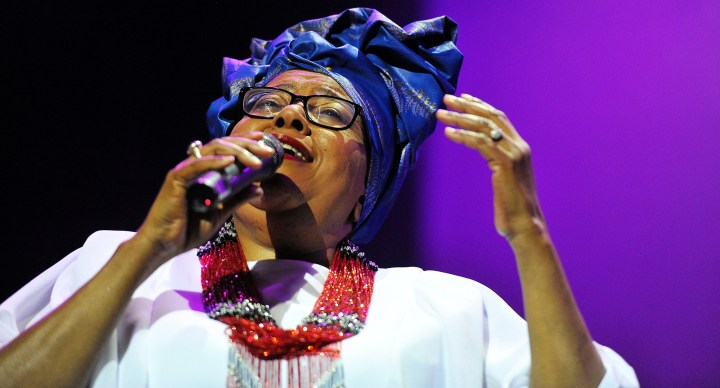
In this dreadful season of global dying and the loss of so many here and elsewhere, the passing of musician Sibongile Khumalo last week has been especially painful. Yes, of course, every loss diminishes us, just as John Donne taught us, but Sibongile was special, even unique, and she touched so many in her time among us. And at 63, her time among us ended too soon. She had much more to give — as a musician, as an educator, as a preserver of traditions — and as a person.
My wife Ruth and I both knew her over many decades, although she had known her even longer than I had. Their acquaintance reached back to a time when Sibongile was barely a teenager and Ruth was in the early stages of her own music educator career.
In those days, of course, concert venues were almost always closed to black South Africans, and so people like Ruth’s parents (and Sibongile’s, for that matter) would organise private home recitals and soirees whenever it was possible.
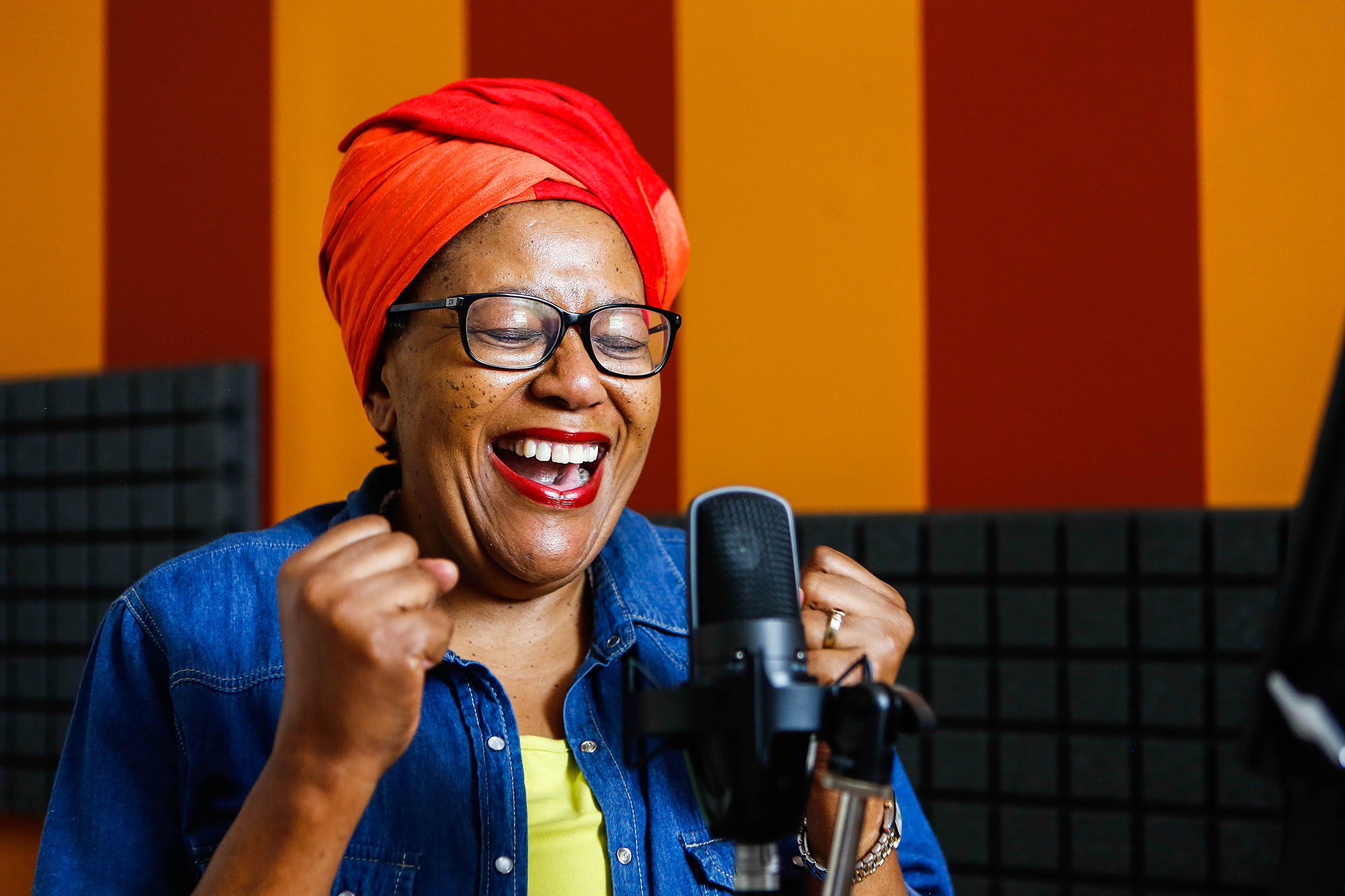
Sibongile Khumalo during an interview in February 2016. (Photo: Gallo Images / The Times / Moeletsi Mabe)
Ruth’s father had been well acquainted with Sibongile’s father, Khabi Mngoma, through their respective educational and musical activities, despite the burdens and restrictions of apartheid. As we talked about Sibongile’s passing, Ruth recalled a home concert where 13-year-old Sibongile had played her cello, with a small group of other good musicians from Ruth’s own community.
Remembering Sibongile’s father, Khabi had built a wide-ranging career as a musical educator and organiser, despite the oppressive times of 1960s and ’70s apartheid-era Johannesburg. Khabi had created the highly regarded Ionian Male Choir for adult singers, as well as the Soweto Youth Orchestra that rehearsed in the YMCA in Orlando West (in which young Sibongile would play the cello). All of these efforts were, by definition, forced to be segregated for Africans only.
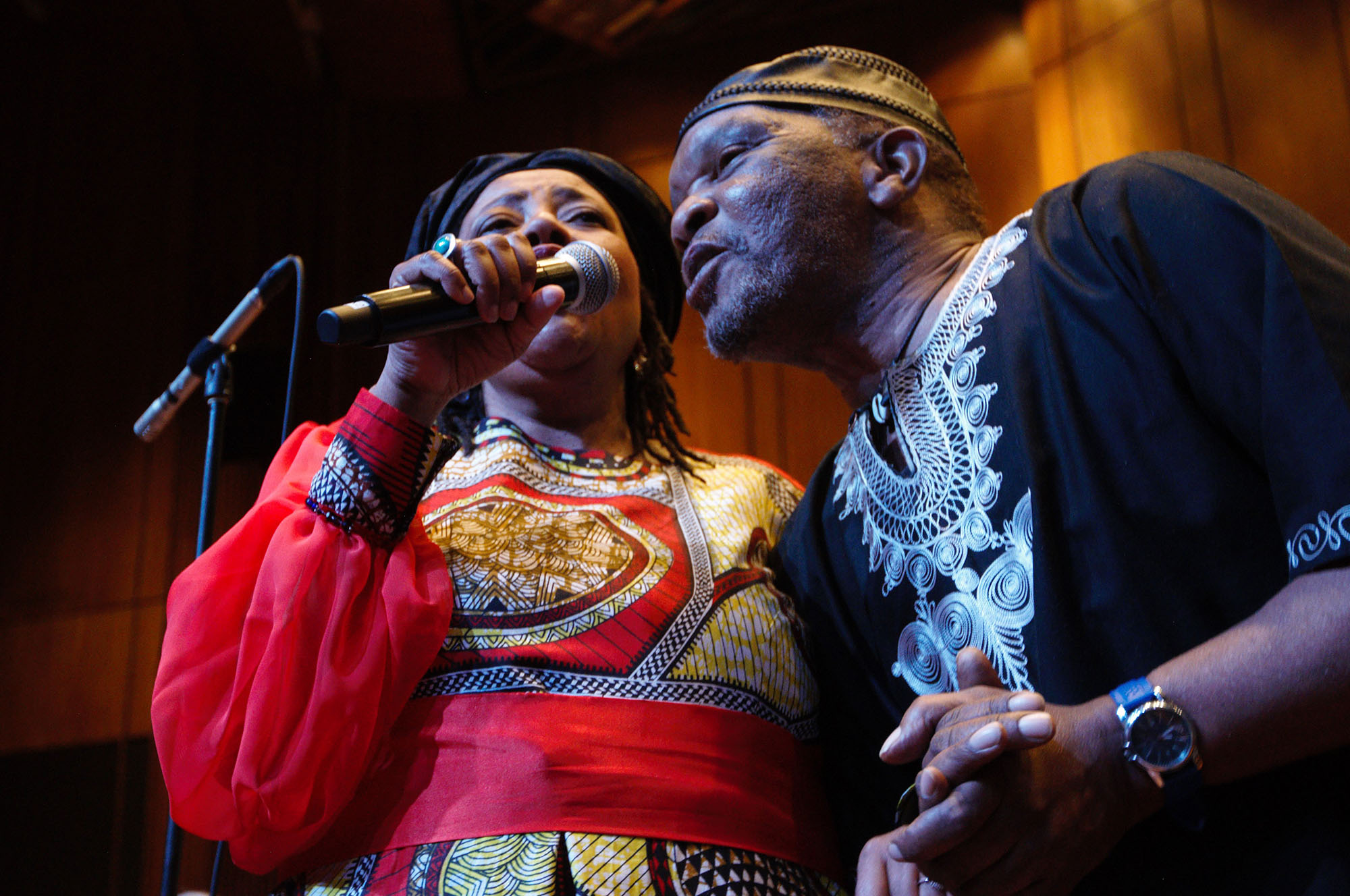
Sibongile Khumalo and Pops Mohamed during the World Refugee Day commemoration concert held at Linder Auditorium on 21 June 2019 in Johannesburg. (Photo: Gallo Images / Laird Forbes)
Khabi organised choral music festivals; he was also executive secretary of the Y, and he also managed the African Music and Drama Association/Union Artists (Amda/UA), a multidisciplinary cultural body based in Dorkay House in downtown Johannesburg in a former clothing factory. Amda/UA, despite the country’s laws, encouraged integrated, multicultural activities and programmes.
Khabi’s choir made professional recordings of their performances. On one side of the vinyls there were performances of great choruses from western operas and oratorios. But to show the versatility of his choir, on the other side of the disk there would be settings of Africa’s own musical heritage of traditional, indigenous works, as well as music by composers such as John Knox Bokwe, arranged for choirs.
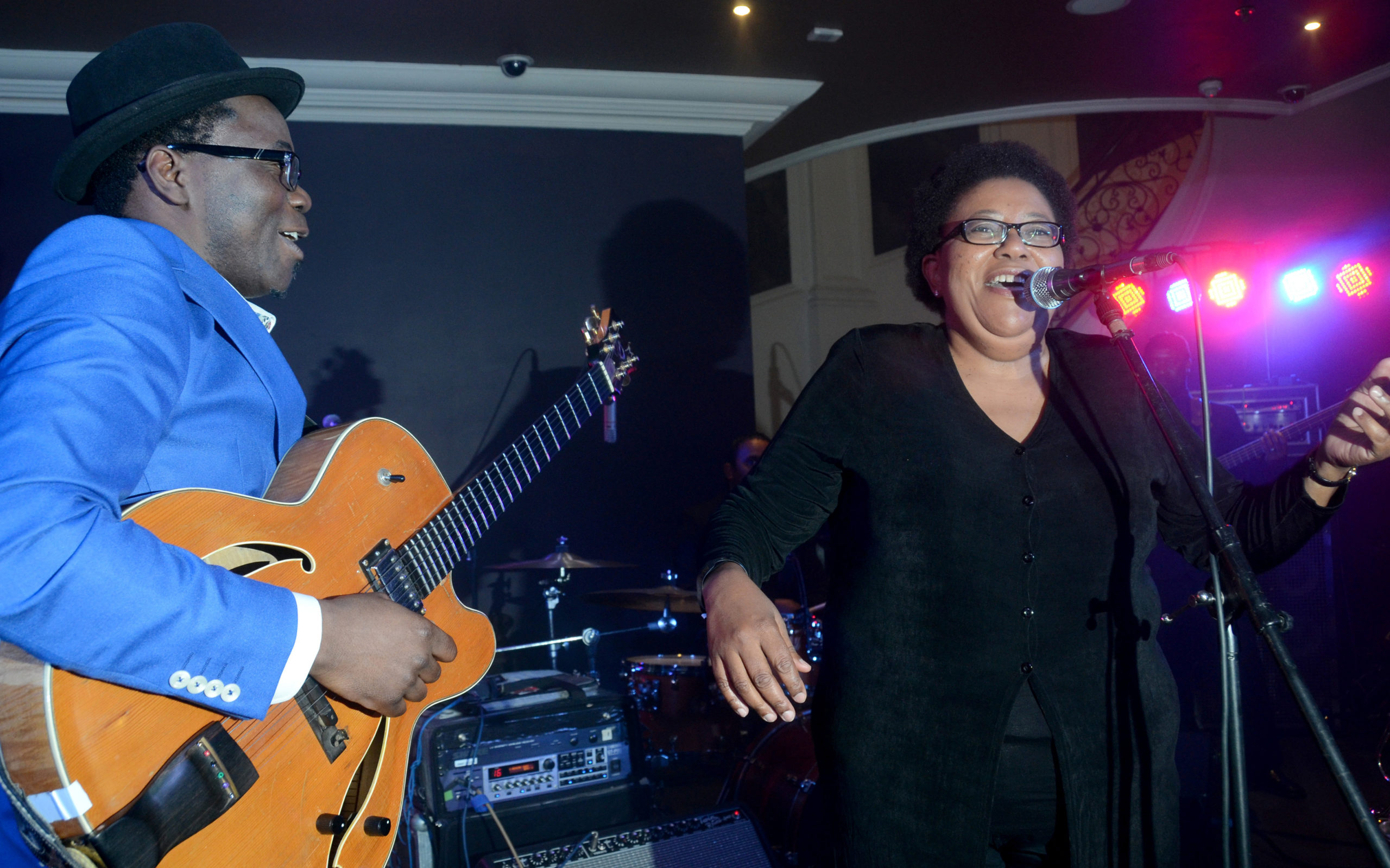
Jimmy Dludlu and Sibongile Khumalo in 2011. (Photo: Gallo Images / Oupa Bopape)
In between all this activity, he also taught violin to young pupils. (Showing the deep connections among supporters of music education among the country’s black communities, one of Khabi’s own music instructors had been a long-time family friend of Ruth’s father, years before all this constant activity really took off.) To help finance Amda/UA, Khabi had convinced legendary Broadway producer Hal Prince to donate a share of his royalties from his shows produced by South Africans to Amda/UA.
Still earlier in his life, as a school teacher, Khabi had been a colleague of Africanist educators such as Es’kia Mphahlele and Zeth Mothopeng, before they had been driven out of teaching. Along the way, Khabi also became an early leader for teaching music through student marimba bands. But, eventually, amid a climate of growing student unrest and protest, Khabi moved his family from Soweto to the University of Zululand where he had been asked to head music education there.
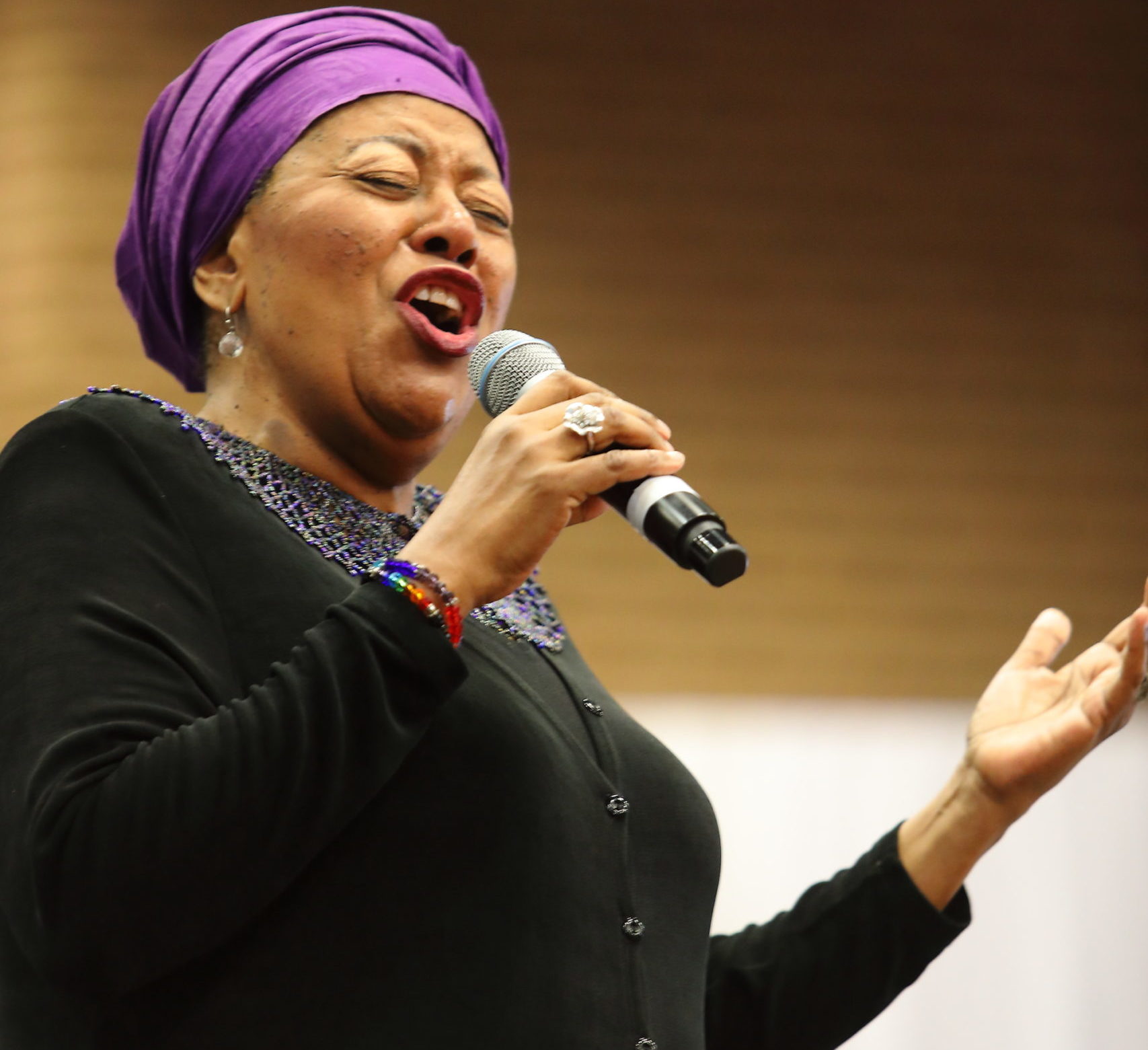
Sibongile Khumalo performs at the official funeral of Dr Richard Maponya at the University of Johannesburg Soweto Campus on 14 January 2020. (Photo: Gallo Images / Fani Mahuntsi)
Until he left Johannesburg, Khabi could often be spotted weaving his way through the city traffic while perched on his Vespa scooter, and he might even arrive at events with his wife, Grace, and daughter, Sibongile, balanced precariously on that scooter as well. He usually had a violin case strapped to his back as well, just in case.
We have given over a few paragraphs to Sibongile’s father to help cast light on the musical influences that helped shape her own musical and intellectual education, that, over time, became tributaries to her own more expansive musical journey. Her own musical world would never be restricted to just a single genre. (For opera singers, there is often a temptation to reach beyond their metier, as with Renee Fleming with her album, Dark Hope, or, earlier, Eileen Farrell’s I’ve Got a Right to Sing the Blues, that played off the title of jazz legend Billie Holliday’s standard, among many others. But Sibongile never seemed to try to reach out to the many genres. Rather, they came to her, organically, from her life and the rich influences on her, and became part of her sound.)
As Stellenbosch University professor Christine Lucia wrote, “The passing of Sibongile Khumalo at the far, far too young age of 63 was a body blow. Sibongile epitomised ‘the new South Africa’, as it was born and as it matured. She sang in every style – from Carmen to UShaka – with equal accuracy, generosity and joie de vivre, making everything ‘popular’ to millions of people without ever sacrificing vocal or musical professionalism. This was one of her greatest gifts, that she made a place for everyone with her voice, a golden, melting voice that made all, young and old, rich and poor, professors and farmers, feel ‘at home’.”
By the 1980s, in addition to her own burgeoning musical activities, Sibongile became an important presence at two key educational institutions where she taught music and created special cultural projects. These were the Funda Centre in Diepkloof, Soweto, and at FUBA — the Federated Union of Black Artists — in Newtown, Johannesburg, just across the street from the Market Theatre.
In the turbulent 1980s, these two centres, and the people who gathered there, were important elements in the rise of a new black artistic nationalism and cultural expression in South Africa. At those two centres, Sibongile worked with rising stars such as poet and essayist Sipho Sepamala, playwright and artist Matsemela Manaka, composer Motsumi Makhene and dancer/choreographer Nomsa Manaka, among others.
In one of Sibongile’s early theatrical roles, she and Nomsa Manaka had wowed audiences and critics in Matsemela Manaka’s, Goree, first performed at the Market Theatre in 1989; but many more projects followed. (This work’s name came from Goree Island, one of the main jumping-off ports for captured Africans being force-fed into the trans-Atlantic slave trade.)
Within a few years, in 1993, Sibongile had become a Standard Bank Young Artist Awardee and she was being cast in operas such as Aida and Carmen. Then came Princess Magogo. Early in her own life, at the instigation of her father, Sibongile had actually met Princess Magogo ka Dinizulu, a direct member of the Zulu royalty, and the mother of Mangosuthu Buthelezi. Magogo had been charged by her family to preserve and teach the traditional music of a nation then broken by defeat in battle and ground down into subservience at the apogee of British colonial expansion.
As Sibongile described her encounter with Princess Magogo, “My dad made me sit at her feet to listen to her play ugubhu and sing. At the time it did not make sense, but I had to obey. I thought he was being very unkind to me because all the other children were out in the yard playing. It must have been destiny. In my professional years, the music came back and it began to make sense.”
Composed by Mzilikazi James Khumalo to a text by poet Themba Msimang, Princess Magogo was produced by Opera Africa’s co-leaders, Sandra and Hein de Villiers, and Sibongile Khumalo was cast in the title role. The work was a major hit domestically and thereafter it travelled to America at the Ravinia summer festival, near Chicago, among other performances. Sibongile also had a starring role in Mzilikazi Khumalo’s other major work, UShaka, a dramatic oratorio based on the life of King Shaka. By this point, Sibongile’s stardom was becoming abundantly clear to anybody with ears.
She began recording and performing a growing array of music: traditional African material, contemporary jazz-inflected ballads and African jazz, and art songs, among many other forms. But to call her a jazz singer, as she was often labelled, was far too limiting for the varieties of musical repertoire she had embraced and made her own.
The range of her voice was sometimes hard to pin down in the usual terms musicians like to use. She could be a rich, resonant contralto, yes, but she could also deliver the goods in a dramatic soprano voice. (To this writer, she sometimes sounded like an African reincarnation of the famed American contralto, Marian Anderson. Both delivered their music with a beautiful timbre and precise diction — and deep emotion.) Sibongile recorded it all, even children’s songs.
For example, listen to a rendering of one of Princess Magogo’s songs, arranged by Mzilikazi Khumalo, with piano accompaniment set by composer/pianist Peter Klatzow:
And listen here for yet more of her vocal recordings.
Here is how leading composers and conductors in South Africa regarded their experiences working with her. Bongani Ndodana-Breen, whose work, Credo, she had premiered, said of her, “She was always strictly-speaking a mezzo soprano, but with age got comfortable being an alto in the classical music repertoire, as she had that lower register for an alto. I remember her telling me that early in the morning she can do a low E below middle C.
“I wrote something for her in Credo that used her low F after that conversation. She had a great range and understood the technical abilities of her voice, a trait that the German conductor Jonas Alber found amazing conducting her in Credo.”
Conductor Robert Maxym, who had led those UShaka performances and its recording, said of her and her enthusiasm for her work, “She was all of the middle and deep female voices rolled into one. That would about sum it up for her versatility/range. We toured Europe together in 2004 when UShaka formed part of South Africa’s “10 Years of Democracy” celebrations. One time she hugged me so hard my glasses broke (they were hanging on a chain around my neck — never did that again — not the hugging, the chain.”
For this writer, more recently, Sibongile’s participation in Songs of Migration, a theatre piece crafted by Hugh Masekela and James Ngcobo, was a work that was both warm and painful. It contained musical evocations of the many different peoples who had migrated to Johannesburg since its founding (or in songs inspired by that migration, such as Masekela’s classic, “Stimela”).
Sibongile’s moments were magnificent there too, as the play opened at the Market Theatre and then toured Europe and the UK. Showing some real acting chops, she even managed to give Masekela “the eye” when he went “too far” on stage. And crowds loved it all. As good as her recordings are, she was incomparable when witnessed live on stage with the energy she brought to the job.
For this author, though, the most poignant moment of her illustrious career that I witnessed personally was in Philip Miller’s concert work, Remix. The work, scored for a double string quartet, choir, and contralto, with visuals by Gerhard Marx, was a setting of testimony drawn from the record of South Africa’s Truth and Reconciliation Commission. Sibongile’s performance of Mrs Plaatjie’s agonies about her young son’s sudden death in a street protest is so right-to-the-bone that when I first learnt of Sibongile’s passing, this was the music I searched for online first to turn to for solace, to help remember the impact Sibongile Khumalo had on audiences. Steel yourself and listen to it:
Throughout her career, as she rose on her artistic trajectory, and well after her teaching days at Funda and FUBA, she still found ways to mentor younger singers and to help give them public performance moments, as in a triumphal three-day celebration of her 60th birthday at the Market Theatre. On the final evening, rather than holding the stage herself, she showcased a bevy of younger talent. Many who are offering their own memories of Sibongile Khumalo online and elsewhere have touched on her warmth and humanity, and her understanding of the need to honour tradition and respect musical and cultural forebears.
When I asked Ruth how she saw this, she wrote this for me in response to my questions:
“Sibongile in song was the spectacular, celebratory cultural manifestation in the 1990s of 40 years of optimistic struggle that found cultural and spiritual motivation to transcend discriminatory laws, born in the hearts of South Africans distressed by the cruel Apartheid laws of formal racial discrimination after 1948. Her parents, like mine, were among those educators who negotiated the shifting tides, but never breaking ties with the full range of people across the lines of colour, culture and education they had long befriended.
“She is said to have complained smilingly through one interview about not being given permission to play much as a child. Instead, her charismatic, irrepressible father insisted she meet, greet and sing or perform on her stringed instrument in churches, classrooms, teaching halls, choir festivals, at grass hut homesteads, and in “matchbox” homes — and improvising harmonies for jazz, or hymns harmonised in indigenous tones. Our home was but one place, but I bet that with the disapproval of the upright Grace, her mother, her father might have sneaked her into a jazz club or two.
“Her quiet, respectful self-assurance in any setting, her range of musical experiences, her confidence in expressing her complex personal identity, and her diplomatic but firmly freedom-framed, political identity, together with her sweet humility about her wonderful achievements, have made her a towering, and time-enduring woman.”
Sibongile, herself, in a recorded radio interview, had described her own life.
Circling back to her father’s role in her life, it seems to me she drew much inspiration from him about the responsibilities of educating and mentoring the next generation of artists; and about the need to embrace and respect the past — and the people who did their share, regardless of whether they gained renown from their exertions. As a person, she was a warm human being — an African, female “mensch”, if you will. She left us too soon and there was still so much more we might have heard and learnt from her in the future.
As a closing thought, I turn to Ruth’s feelings about Sibongile Khumalo as a person and musician.
“The mischievous, earthy, versatile, gregarious Sibongile Khumalo, née Mngoma, whom I knew, was a poet at heart. She was not an acolyte of confrontation, but a sweet, earthy woman, but with the soul of a warrior, reflecting the ‘jazzers’, jivers, improvisers, choristers, and soloists, all with equal aplomb.
“She stood between several cultural worlds and styles, but with an idiom and tone all her own. Her mastery in her vast output of recordings ensures her shimmering, liquid, golden upper tones, and her lower djembe-timbred cello-like tones will forever be our voice that will continue to embody a harmonious nation out of a diverse South Africa. She knew the street and the struggle, and she helped map the road forward to the culmination.”
We shall miss her greatly. DM



















 Become an Insider
Become an Insider
Comments - Please login in order to comment.